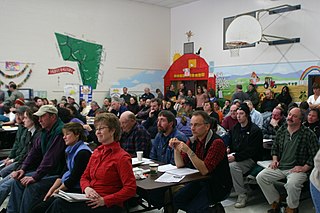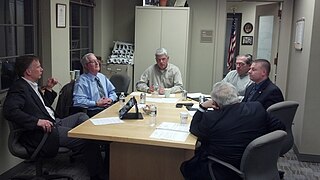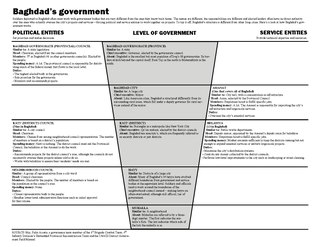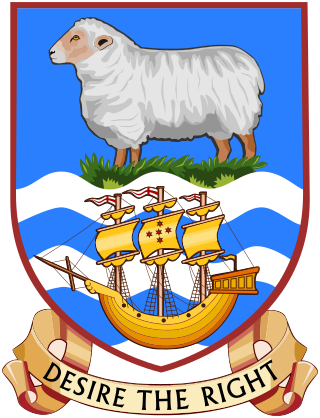
Town meeting is a form of local government in which most or all of the members of a community are eligible to legislate policy and budgets for local government. It is a town- or city-level meeting in which decisions are made, in contrast with town hall meetings held by state and national politicians to answer questions from their constituents, which have no decision-making power.

The Connecticut General Assembly (CGA) is the state legislature of the U.S. state of Connecticut. It is a bicameral body composed of the 151-member House of Representatives and the 36-member Senate. It meets in the state capital, Hartford. There are no term limits for either chamber.

The administrative divisions of New York are the various units of government that provide local services in the State of New York. The state is divided into boroughs, counties, cities, towns, and villages. They are municipal corporations, chartered (created) by the New York State Legislature, as under the New York State Constitution the only body that can create governmental units is the state. All of them have their own governments, sometimes with no paid employees, that provide local services. Centers of population that are not incorporated and have no government or local services are designated hamlets. Whether a municipality is defined as a borough, city, town, or village is determined not by population or land area, but rather on the form of government selected by the residents and approved by the New York State Legislature. Each type of local government is granted specific home rule powers by the New York State Constitution. There are still occasional changes as a village becomes a city, or a village dissolves, each of which requires legislative action. New York also has various corporate entities that provide local services and have their own administrative structures (governments), such as school and fire districts. These are not found in all counties.

The select board or board of selectmen is commonly the executive arm of the government of New England towns in the United States. The board typically consists of three or five members, with or without staggered terms. Three is the most common number, historically.

The Tennessee General Assembly (TNGA) is the state legislature of the U.S. state of Tennessee. It is a part-time bicameral legislature consisting of a Senate and a House of Representatives. The Speaker of the Senate carries the additional title and office of Lieutenant Governor of Tennessee. In addition to passing a budget for state government plus other legislation, the General Assembly appoints three state officers specified by the state constitution. It is also the initiating body in any process to amend the state's constitution.
A vestry was a committee for the local secular and ecclesiastical government of a parish in England, Wales and some English colonies, which originally met in the vestry or sacristy of the parish church, and consequently became known colloquially as the "vestry". At their height the vestries were the only form of local government in many places and spent nearly one-fifth of the budget of the British government. They were stripped of their secular functions in 1894, and were abolished in 1921.
Massachusetts shares with the five other New England states a governmental structure known as the New England town. Only the southeastern third of the state has functioning county governments; in western, central, and northeastern Massachusetts, traditional county-level government was eliminated in the late 1990s. Generally speaking, there are four kinds of public school districts in Massachusetts: local schools, regional schools, vocational/technical schools, and charter schools.
A representative town meeting, also called "limited town meeting", is a form of municipal legislature particularly common in Connecticut and Massachusetts, and permitted in Maine, Vermont and New Hampshire.

The town is the basic unit of local government and local division of state authority in the six New England states. Most other U.S. states lack a direct counterpart to the New England town. New England towns overlay the entire area of a state, similar to civil townships in other states where they exist, but they are fully functioning municipal corporations, possessing powers similar to cities in other states. New Jersey's system of equally powerful townships, boroughs, towns, and cities is the system which is most similar to that of New England. New England towns are often governed by a town meeting legislative body. The great majority of municipal corporations in New England are based on the town model; there, statutory forms based on the concept of a compact populated place are uncommon, though elsewhere in the U.S. they are prevalent. County government in New England states is typically weak at best, and in some states nonexistent. Connecticut, for example, has no county governments, nor does Rhode Island. Both of those states retain counties only as geographic subdivisions with no governmental authority, while Massachusetts has abolished eight of fourteen county governments so far. Counties serve mostly as dividing lines for the states' judicial systems and some other state services in the southern New England states, while providing varying services in the more sparsely populated three northern New England states.
A municipal council is the legislative body of a municipality or local government area. Depending on the location and classification of the municipality it may be known as a city council,town council, town board, community council, rural council,village council, or board of aldermen.

The municipal government of Toronto is the local government responsible for administering the city of Toronto in the Canadian province of Ontario. Its structure and powers are set out in the City of Toronto Act.

The government of the U.S. State of Oklahoma, established by the Oklahoma Constitution, is a republican democracy modeled after the federal government of the United States. The state government has three branches: the executive, legislative, and judicial. Through a system of separation of powers or "checks and balances," each of these branches has some authority to act on its own, some authority to regulate the other two branches, and has some of its own authority, in turn, regulated by the other branches.
United States Intelligence Community Oversight duties are shared by both the executive and legislative branches of the government. Oversight, in this case, is the supervision of intelligence agencies, and making them accountable for their actions. Generally oversight bodies look at the following general issues: following policymaker needs, the quality of analysis, operations, and legality of actions.
Local government in New Jersey is composed of counties and municipalities. Local jurisdictions in New Jersey differ from those in some other states because every square foot of the state is part of exactly one municipality; each of the 564 municipalities is in exactly one county; and each of the 21 counties has more than one municipality. New Jersey has no independent cities, or consolidated city-counties.

The government of Baghdad is divided into a hierarchy of governments that both aid governance and provide bottom-up representation. The city constitutes a new “capital territory” whose structure differs from other parts of the country.
The Commonwealth of Massachusetts is governed by a set of political tenets laid down in its state constitution. Legislative power is held by the bicameral General Court, which is composed of the Senate and House of Representatives. The governor exercises executive power with other independently elected officers: the Attorney General, Secretary of the Commonwealth, and Auditor. The state's judicial power rests in the Supreme Judicial Court, which manages its court system. Cities and towns act through local governmental bodies to the extent that they are authorized by the Commonwealth on local issues, including limited home-rule authority. Although most county governments were abolished during the 1990s and 2000s, a handful remain.
A moderator is an official of an incorporated town who presides over the town meeting, and in some cases, other municipal meetings. In the United States, the New England town is best known for the town meeting form of government. The office of moderator exists in at least Connecticut, Maine, Massachusetts, New Hampshire, Rhode Island and Vermont.

The Falkland Islands Constitution is a predominantly codified constitution documented primarily within the Falkland Islands Constitution Order 2008, a statutory instrument of the United Kingdom. The Constitution, in its present form, was made on 5 November 2008 by Queen Elizabeth II in a meeting of the Privy Council at Buckingham Palace. It was laid before Parliament on 12 November 2008 and came into force on 1 January 2009, replacing the 1985 constitution.
A clerk is a senior official of many municipal governments in the English-speaking world. In some communities, including most in the United States, the position is elected, but in many others, the clerk is appointed to their post. In the UK, a Town or Parish clerk is appointed by the Town or Parish Council Members. In almost all cases, the actual title of the clerk reflects the type of municipality they work for, thus, instead of simply being known as the clerk, the position is generally referred to as the town clerk, township clerk, city clerk, village clerk, borough clerk, board secretary, or county clerk. Other titles also exist, such as recorder. The office has existed for centuries, though in some places it is now being merged with other positions.









